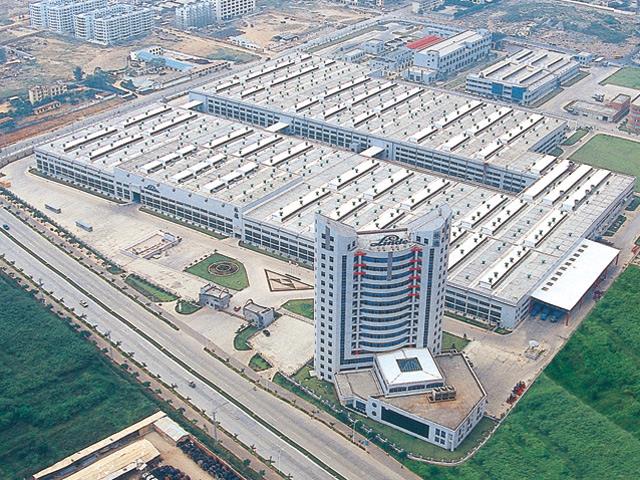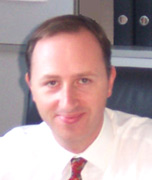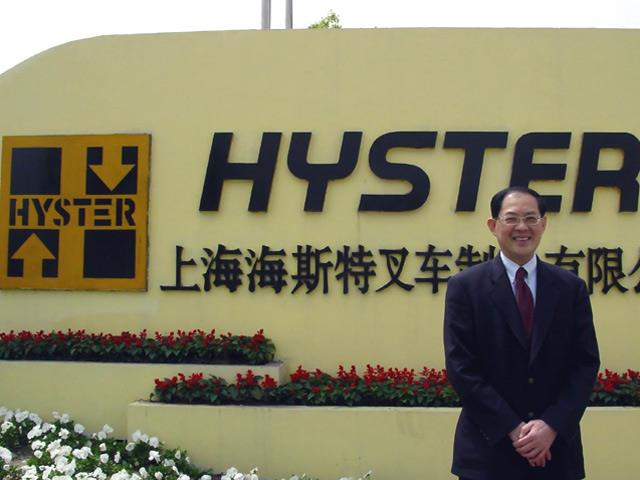 Linde's Xiamen headquarters with factory in the background. |
China Industrial Truck Association (CITA) managing director Su Enyi has said forklift sales for foreign companies grew more than Chinese companies in 2005. Forkliftaction.com News reporter
Christine Liew speaks to three foreign forklift manufacturers about the Chinese market.
Linde Material Handling had the prudence to be the first foreign forklift manufacturer to invest in China 13 years ago.
Today, Xiamen-based Linde (China) Forklift Truck Corp, established with an initial investment of RMB1.7 billion (USD212 million) in December 1993, has 1,400 employees in 35 branches covering more than 220,000 square metres in facilities.
Antoine Chazelle, who has worked in marketing and national accounts for Linde China in Xiamen city, Fujian province, for the past four and a half years, believes foreign companies must be quick to get a slice of the Chinese pie.
"We see that with all our customers in Europe and the USA. The first who comes here has a chance to get the biggest slice of the pie. It all happens very quickly," he said.
China is currently the world's third largest forklift market with CITA estimating the 2005 market size at 67,120 units sold. In 2004, 60,651 units were sold, 44,204 units in 2003 and 33,221 units in 2002. Industry insiders estimate the market will swell to 112,000 units in 2009 - 90,000 internal combustion forklifts and 22,000 electric forklifts. Foreign manufacturers have more than 25 per cent share of the Chinese market.
When Linde first arrived, its customers were mainly foreign companies who knew of Linde in their home countries. They came to China for a slice of the pie in their own industries and had many details to attend to. With Linde present in China, they readily entrusted their material handling needs to the global brand. Today, things are changing. Linde's customers now include Chinese state-owned and private companies.
"There is a mind switch happening," Chazelle says. Linde forklifts are expensive but Chazelle maintains customers pay for quality.
 Antoine Chazelle, Linde Xiamen's marketing manager. |
According to Chazelle, there are two groups of Chinese customers. First, there is the customer who only evaluates cost in light of the initial purchasing price. That customer is not concerned about product quality, lifetime cost or optimising material flow. The high-end customer is interested in lifetime cost and cutting logistics costs. High-end customers make up at least 25 per cent of the market and foreign companies compete for their business.
Chazelle said the two types of customers were growing at the same rate.
"[But] when the industry stabilises, I believe the high-end customer group will grow faster than the low-end group. That is when rationalising, optimising costs and logistic flows become priorities."
Last October, CITA president Su Enyi told the Industrial Truck Association (ITA) annual meeting in Rancho Mirage, California, that foreign companies sold 15,300 forklift units in the year to September, a 17.26 per cent growth over the same period in 2004. Chinese companies sold 40,700 forklifts, a 10.7 per cent increase.
Forkliftaction.com News sources say foreign manufacturers, like Hyundai and TCM, were now offering lower-priced forklifts to compete with Chinese manufacturers Hangzhou Forklift Truck Group, Anhui Forklift Truck Group (Heli) and Dalian Forklift Truck Corp for the low-end market. Chazelle said Linde had no plans to compete on the low-end market and would continue to educate Chinese customers on the benefits of "premium quality" forklifts.
"Our basic philosophy to offer quality and speak of lifetime costs of owning forklifts has never changed. Only our marketing tools have been adapted for China."
To promote Linde as a quality brand, the Linde subsidiary offers a 10-year warranty on its hydrostatic transmission.
Chazelle said Linde's hydrostatic transmission was unique to its internal combustion counterbalanced truck, and competitors did not have it. Chazelle would not name Linde's competitors, but said most were based in Shanghai, Beijing, Shandong and a few in Guangdong. "The ones who came earliest have the highest market share," he said.
Linde's entire product range is available in China. The Xiamen plant builds 1.5 to 3 tonne capacity diesel and electric counterbalanced forklifts, which have foreign engines and Linde transmissions. Chazelle would not disclose the percentage of the forklifts' parts that were locally made but said localisation of Linde products would better serve Chinese customers.
 Hyster China managing director KH Hong standing outside the Shanghai plant. |
Hyster China, established eight years ago in Shanghai, is one of Linde's competitors. Last year, Hyster bought its Chinese partner, Shanghai Pufa Company, and is now jointly owned by Nacco Materials Handling Group (NMHG), USA, and Sumitomo, Japan. NMHG, based in Portland, Oregon, has three forklift brands, Hyster, Yale and Shinko, but sells only the Hyster brand in China.
Like Linde, Hyster locally manufactures forklifts that are in high demand in the Chinese market. Counterbalanced internal combustion and electric forklifts with 1.5 to three tonne capacities are built in Shanghai. The forklifts have Japanese-made Yanmar engines and Japanese-built, Hyster-designed transmissions.
Hyster China managing director KH Hong said production of Hyster's container handlers, reach stackers, eight tonne and above forklifts and warehouse range may be localised in future to meet Chinese demand.
Singapore-born Hong, who has been with Hyster China, in Shanghai, for two years, said the Chinese forklift market rested on the internal combustion counterbalanced forklift, which was akin to the Chinese "workhorse".
"That's the standard, multipurpose forklift. If you have only one forklift in China, this is what you likely owned."
He said there were about 50 small, regional Chinese forklift manufacturers that produced two to three tonne internal combustion forklifts and motorised pallet trucks. They included Chinese brands Hytsu, Xilin, Kaesar, Noblift, Ningbo Ruyi and Dingli.
The bulk of Chinese-made forklifts are produced by China's "big three" - Heli, Hangzhou and Dalian. According to CITA statistics, the three combined have 60 per cent of China's market share. About 10 per cent of those manufacturers' forklifts have imported engines.
High quality and higher-priced forklifts produced by foreign manufacturers, like Hyster, were likely to act as a catalyst for technological advances among China's local manufacturers, Hong said.
"There will be a convergence of features in the future. Local manufacturers will improve their features while we will localise to be price competitive. We will move down to take the food chain and other [local] brands will move up," he said.
 Tailift's plant in Shandong province. |
There is a foreign manufacturer that claims to sell more forklifts than local forklift manufacturer, Dalian. Established in 1976 in the Taiwanese town of Nantou, Taiwan's largest forklift manufacturer, Tailift, makes this claim. According to
dhf-intralogistik editor Wolfgang Degenhard, Tailift started assembling forklifts in China in 1997. In 2004, Tailift sold EUR71 million (USD87.6 million) of forklifts, up 39 per cent on 2003's EUR51 million (USD62.9 million). It had 423 employees at the end of 2004.
Louis Sun, Tailift assistant general manager for international sales, said 70 per cent of its forklifts produced at Tailift's plant in Jiaozhou, Shandong province, were for the Chinese market and 30 per cent for export. Tailift's Chinese plant produces 5,000 forklifts a year.
Sun said Tailift's advantage over Chinese manufacturers was that it made its own transmissions. That began in July 1998. The transmissions are available in its 3,000lb (1,361kg) to 8,000lb (3,629kg) cushion and pneumatic tyre internal combustion forklifts.
"Before, we were using a ZF transmission, which was too expensive and then one by a Chinese manufacturer. We exported our forklifts with the Chinese-made transmissions to USA and five years ago there was a problem because they didn't work properly. It was mainly to do with the torque converter not being good enough to run the transmission.
"So we sent our engineers to study in mechanical associations that provided resources and lessons in Germany and Japan, to reinforce their abilities.
Based on Tailift's market intelligence, China's forklift market in 2005 was dominated, in order of highest forklift sales, by Heli, Hangzhou, Tailift, Dalian, Hyundai and Linde. Heli had around 29 per cent share of the market, Hangzhou, 24 per cent, and Tailift 6.3 per cent. Foreign players were estimated to have one to four per cent share of the Chinese forklift market.
Sun said while Tailift may consider building its own engine in the future, it was not a current priority. "The engine is like the human heart in the forklift. It's not that easy to build and there is lots to plan and organise in terms of getting the technology and training people." For now, Tailifts' transmission, control valves and steering axle are made in Taiwan and exported to its Chinese production plant.
Sun cautioned foreign companies seeking to enter the Chinese market.
"If anyone wants to invest in China they have to consider the different human resource management [techniques]. If you tell Chinese people you want a certain thing done, you have to stand there and watch them do it or they will change the production procedure.
"In China, they don't think they have to fit into foreign culture. Labour is cheap but educating people is quite difficult. Foreign companies need to send their top management people to stay in China for some time to manage the business."
Sun said it was unwise for foreign companies to manage China-based businesses from overseas. He said Tailift's factories were managed by Taiwanese personnel.
Hyster's Hong said the Shanghai-based company had no problem with the quality of its Chinese workers.
"Our biggest challenge as we are located in Shanghai is to attract and retain good employees. There are lots of opportunities for career development in Shanghai and we are experiencing the turnover challenge like most growing foreign-owned companies."
Chazelle said Linde had had to adapt to the Chinese culture.
"In Europe, you knock on the door of a company, ask a few questions and can very quickly know how the business is organised because there is a procurement department, a logistics department, a maintenance department, etcetera. In China, it's not 100 per cent clear to outside eyes who is responsible for what.
"Our management understands now we must make more visits to the customer and the orders are not as quick to get as in Europe. Early on, we pushed our people to close the deal quickly but now we understand there's a process we have to accept."
But Chazelle said China was also adapting. "There's modern China and the China of 30 years ago. Some Chinese companies no longer operate in a state-owned, non-competitive environment and are facing international competition and so have good customer service and focus, for example Haier, the Chinese white goods company."